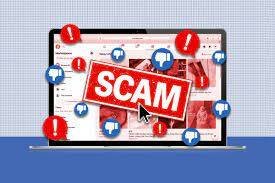Protect yourself from Facebook scams with this beginner’s guide! Learn how to recognize and avoid common scams on Facebook, including phishing, fake giveaways, and romance scams. Stay safe online and keep your personal information secure with these tips and tricks. When you first start using Facebook, you may think it’s the perfect place to connect with friends, family, and other people you know. But like any social media platform, Facebook is also home to scams.
Facebook scams are particularly common, as they take advantage of the fact that people are often looking for ways to make quick money. Here are a few tips to help you avoid Facebook scams and stay safe online.
What is a Facebook scam?
There are a lot of scams that can happen on Facebook, and it’s not always easy to tell the difference between a legitimate offer and a scam. If you’re new to Facebook, or if you don’t know how to spot scams, this guide will help you stay safe.
When you sign up for Facebook, you give your information name, email address, and other personal details to the company. This means that anyone who knows these details can try to scam you by sending you fake offers or messages from bogus companies.
Tips to keep yourself safe on Facebook:
Staying safe on Facebook is essential in today’s digital age. Here are some tips to help you keep yourself safe on Facebook:
- Don’t give away your personal information without verification. Many Facebook scams start with requests for personal information like your name, email address, or phone number. Don’t trust any offer that requires you to provide this kind of information without first verifying the company is legitimate. Some common ways to verify a company are by checking its website or contact information, or by asking friends who have used the service before.
- Be suspicious of unsolicited messages from strangers on Facebook. Scammers often use deceptive methods like spam emails or text messages to contact people online. Be sure to never send any money or sensitive personal information through unsolicited messages on Facebook! Instead, contact Facebook directly if you need help with any account-related questions or issues.(facebookhelpdesk@facebook.com)
- Use strong passwords that are unique to Facebook and avoid using the same password for different accounts.
- Do not share your personal information such as your home address, phone number, and email address on Facebook. Be cautious about sharing sensitive information with anyone online.
- Verify the authenticity of friend requests before accepting them. Look for mutual friends and mutual interests to ensure the request is from a real person.
- Do not click on links from unknown sources, especially those that promise free gifts or prizes. These links may lead to scams or phishing attempts.
- Enable two-factor authentication to add an extra layer of security to your account.
- Report suspicious activity on Facebook, including any spam or suspicious messages you receive.
- Keep your computer, phone, and other software up to date to protect yourself against potential security vulnerabilities.
By following these tips, you can stay safe on Facebook and protect yourself from potential scams and identity theft.
How to recognize a Facebook scam
- If you’re new to Facebook, it can be hard to tell the difference between a legitimate and a fraudulent account. Here are a few tips to help you identify a scam:
- 1. Beware of fake profiles. If an account seems suspicious, look for clues that it’s not real. For example, if the profile is fake or contains offensive content, the person behind it probably isn’t who they say they are.
- 2. Check out the profile picture. The picture is one of the first things people notice about your profile, so make sure it’s accurate and looks like you. If it looks phony, chances are that the person behind the account is also trying to deceive you.
- 3. Be cautious about links in messages and posts. Scammers often use links in their messages or posts as a way to steal your personal information or redirect you to malicious websites. Avoid clicking on any links in messages or posts unless you know for sure that they are safe and legitimate.
- 4. Watch out for unusual requests for personal information. Scammers will often ask for personal information such as your name, email address, or password in order to hijack your account or steal your money. Do not give anyone access to your Facebook account unless you trust them completely!
- 5. Avoid paying for services or products through Facebook. Many scams involve offering bogus services or products through Facebook Messenger or ads on the site.
How to protect yourself from Facebook scams
There are a number of ways to protect yourself from Facebook scams.
Here are some tips:
- 1. Do your research: Before registering for any new service or clicking on any links, be sure to research the company thoroughly. Check out their website, social media accounts, and reviews online. Make sure that the company is legitimate and has a good reputation before signing up.
- 2. Watch out for fake profiles: If someone contacts you through Facebook, be suspicious if the person does not have a profile picture or name listed on their profile. If the person seems too eager to get into your life or tries to pressure you into doing something you don’t want to do, be suspicious. Delete the conversation and report it to Facebook as scammers will often use fake profiles in order to gain your trust.
- 3. Be cautious of unsolicited requests: If someone sends you an unsolicited message or request through Facebook, be cautious and delete it immediately. Scammers will often use unsolicited messages in order to steal your personal information or scam you out of money.
- 4. Be skeptical of offers that seem too good to be true: Always be skeptical when someone offers you something for free or at a low price – 99% of the time these offers are scams designed to steal your personal information or rob you of your money.
- 5. Don’t share too much info: When sharing anything private such as contact information, bank account numbers, etc.,
Conclusion
Facebook is a great way to stay connected with friends and family, but it’s also a perfect place for scammers to take advantage of unsuspecting users. In this guide, we are going to outline the different types of Facebook scams and what you can do to avoid them. By following these tips, you will be able to protect yourself from becoming a victim of a scammer and keep your personal information safe.


